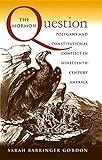The Mormon question : polygamy and constitutional conflict in nineteenth-century America / Sarah Barringer Gordon.
Material type: TextSeries: Studies in legal historyPublisher: Chapel Hill ; London : The University of North Carolina Press, [2002]Copyright date: ©2002Description: 1 online resource (xiv, 337 pages) : illustrationsContent type:
TextSeries: Studies in legal historyPublisher: Chapel Hill ; London : The University of North Carolina Press, [2002]Copyright date: ©2002Description: 1 online resource (xiv, 337 pages) : illustrationsContent type: - 0807875260
- 9780807875261
- 9798890870742
- Polygamy and constitutional conflict in nineteenth-century America
- Mormonen
- Freedom of religion -- United States -- History
- Church and state -- United States -- History
- Latter Day Saints -- Legal status, laws, etc. -- United States -- History
- Polygamy -- Utah -- History
- Law -- U.S
- Law, Politics & Government
- Constitutional Law -- U.S
- Liberté religieuse -- États-Unis -- Histoire
- Église et État -- États-Unis -- Histoire
- Polygamie -- Utah -- Histoire
- LAW -- Constitutional
- LAW -- Public
- Mormons -- Legal status, laws, etc
- Church and state
- Freedom of religion
- Polygamy
- United States
- Utah
- Verfassungsstreitigkeit
- USA
- Law - U.S
- Law, Politics & Government
- Constitutional Law - U.S
- Freedom of religion -- United States -- History
- Church and state -- United States -- History
- Polygamy -- Utah -- History
- Mormons -- United States -- History -- 19th century
- Geschichte 1800-1900
- 342.73/0852 21
- KF4783 .G67 2002eb
- online - EBSCO
- NP 6020
- digitized 2010 HathiTrust Digital Library committed to preserve
| Item type | Current library | Call number | URL | Status | Notes | Barcode | |
|---|---|---|---|---|---|---|---|
 eBook
eBook
|
Biblioteca "Angelicum" Pont. Univ. S.Tommaso d'Aquino Nuvola online | online - EBSCO (Browse shelf(Opens below)) | Online access | Not for loan (Accesso limitato) | Accesso per gli utenti autorizzati / Access for authorized users | (ebsco)79156 |
Includes bibliographical references (pages 297-321) and index.
Introduction: Faith and the contested Constitution -- Part one. The laws of God and the laws of man. The power of the word(s). The twin relic of barbarism. The logic of resistance -- Part two. Days of judgment. Law and patriarchy at the Supreme Court. The erosion of sympathy. The marital economy -- Epilogue: The (un)faithful Constitution.
Use copy Restrictions unspecified star MiAaHDL
"The conflict over polygamy became the preoccupation of novelists, journalists, political cartoonists, and newspaper editors, clerics, lecturers, lobbyists, woman's rights activists, political theorists, missionaries, state and national politicians, criminal defendants and their families, constitutional and criminal defense lawyers, federal and territorial officials, presidents, and Supreme Court justices. This book is about their efforts to explain why the practice of polygamy in the Mormon territory (eventually state) of Utah and surrounding jurisdictions created a constitutional conflict over the meaning and scope of liberty and democracy in the United States. Vast quantities of ink and paper were invested in the project, and yield rich rewards. The 'Mormon Question, ' as many nineteenth-century Americans called it, posed fundamental questions about religion, marriage, and constitutional law. The national Constitution must not shield such immorality, those who opposed polygamy (antipolygamists) argued, or liberty would be fatally compromised. There must be a relationship between the structures of government created by the Constitution and the structures of Christian morality that made civilized life possible. The doubt that swirled about the moral nature of the Constitution, however, meant that such claims were always tinged by uncertainty. Real and significant differences about the core of sovereign authority in America propelled defenders of monogamy into untested constitutional theories, as they struggled to articulate how the national government could assume authority over marriage and faith in Utah. Most important, such arguments met with fierce resistance from Mormons"--Introduction, pages 1/4 (illustrations intervening)
Electronic reproduction. [Place of publication not identified] : HathiTrust Digital Library, 2010. MiAaHDL
Master and use copy. Digital master created according to Benchmark for Faithful Digital Reproductions of Monographs and Serials, Version 1. Digital Library Federation, December 2002. MiAaHDL
http://purl.oclc.org/DLF/benchrepro0212
digitized 2010 HathiTrust Digital Library committed to preserve pda MiAaHDL
Print version record; online resource viewed September 14, 2016.
English.


